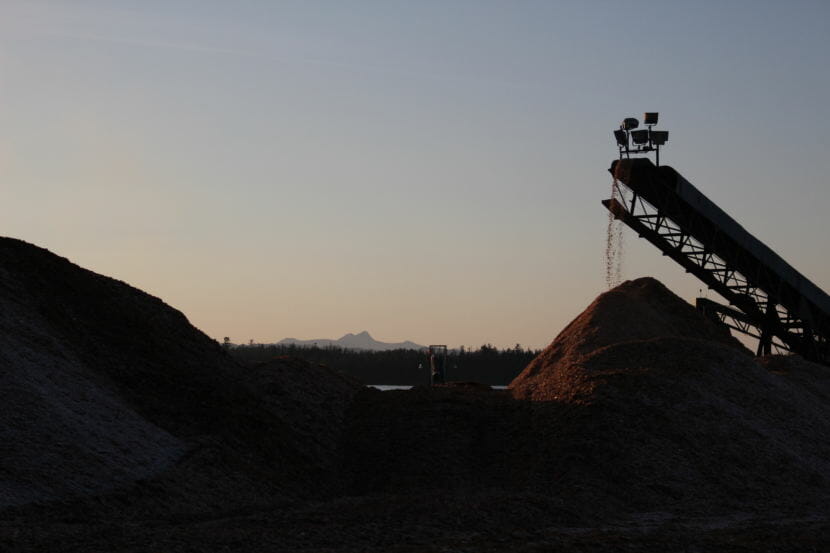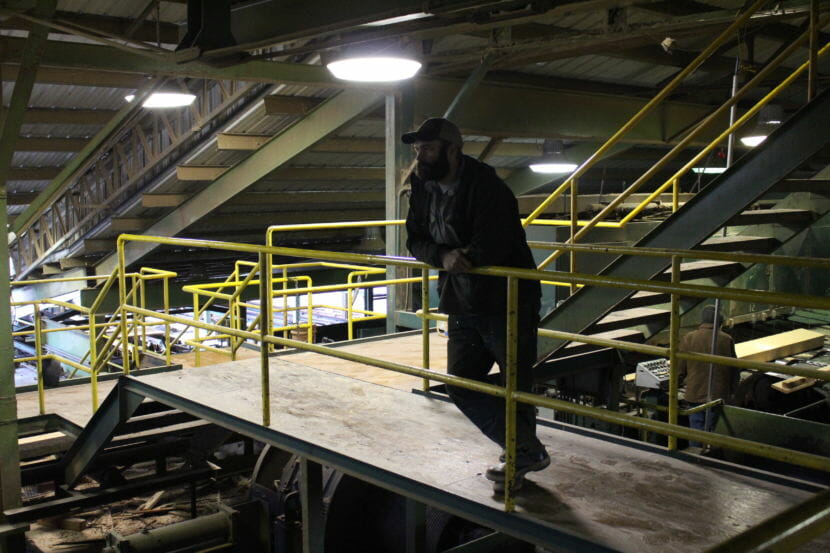
In the spring, the last sizable timber mill in Alaska considered turning off the saws for good. Viking Lumber on Prince of Wales Island cuts large trees like Sitka spruce and yellow cedar. It buys most of those old growth trees from timber sales in the Tongass National Forest. But those sales could become a thing of the past.
The timber industry in Southeast Alaska is a shadow of its former self. But looking around the lumberyard at Viking, you wouldn’t know it. The ground trembles with heavy machinery.
There’s a smell — sweet and woodsy.
In the distance, you can see rows of old growth trees stacked nearly two stories high.
Logs are funneled into a warehouse, where a saw the size of a hot tub slices through the tree’s bark and rounded sides.
The mill produces around eight truckloads of lumber a day. It’s barged and then shipped to 40 states to be turned into door frames, crown molding and sound boards for pianos.
“You try to stay in what you know and you do it well,” said Bryce Dahlstrom, one of the owners.
His family has operated the mill for about the past twenty years. But today, he says he would be reluctant to pass it on to his son.
“If he would have showed interest in the sawmill I think I would have discouraged it. Because it doesn’t look like there’s a future here a lot of the times,” Dahlstrom said. “To be a logger anymore is frowned upon.”
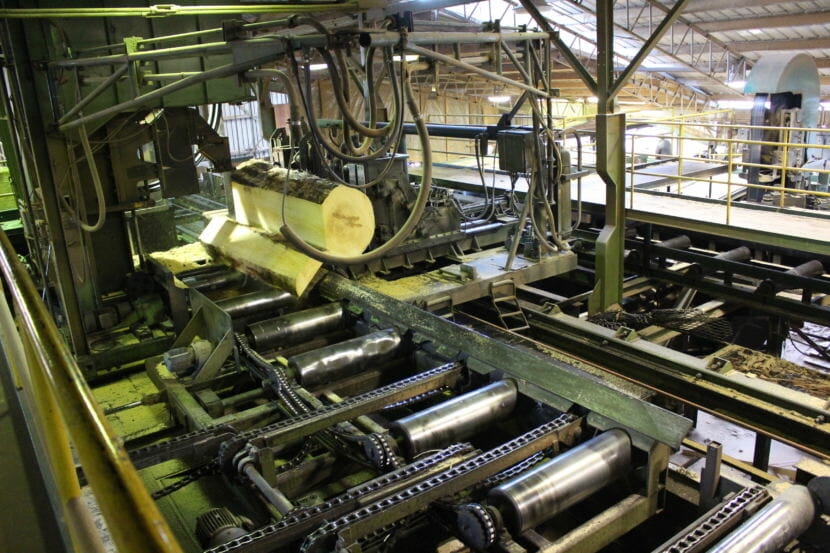
Back in the 1980s, the timber industry in Southeast Alaska was booming, and families, like Dahlstrom’s, saw the state as a land of opportunity.
In the Northwest, tensions were ratcheting up between loggers and environmentalists. More federal protections for the spotted owl added new limits on what areas could be clear cut.
Dahlstrom grew up going to the pro-logging rallies with his parents in Washington state. He says the prospects looked better farther north.
“Alaska at the time had pulp mills. A big timber industry… Shortly thereafter things took a dive here,” Dahlstrom said.
Viking Lumber bids on regional timber sales to supply the mill. Most of the sales are from the Tongass National Forest. In the past, the U.S. Forest Service has allowed large scale industrial logging in the Tongass — damaging salmon streams and deer habitat. That’s led to tighter environmental regulations through the years, which has meant less of the Tongass is available for harvest. Dahlstrom says there have been fewer timber sales, too.
“We’ve fought and we’ve fought and there’s been a lot times since the late 90s that if we didn’t get that next timber sale, we weren’t going to have any wood,” he said.
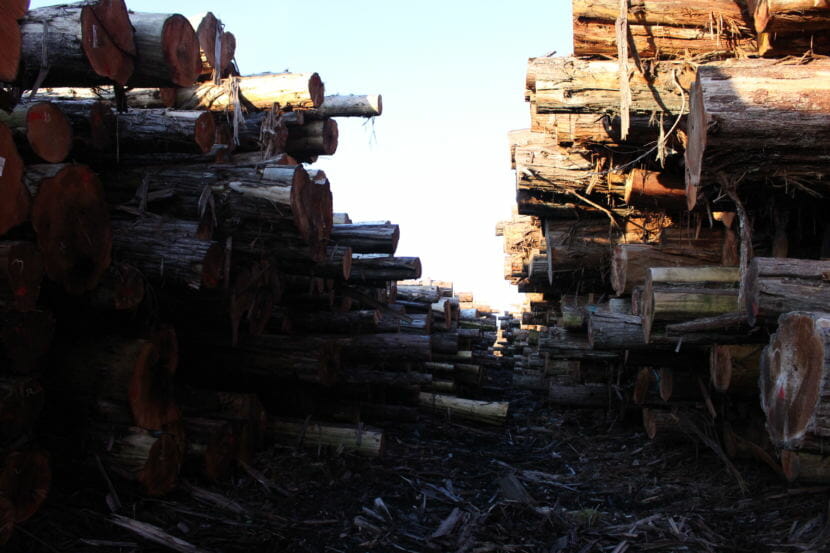
Then last year, the forest service made a monumental decision. It would move away from selling old growth trees in the Tongass altogether, phasing it out entirely after 15 years. Dahlstrom says it looked like the plan would finish off the mill for good.
His employees have come up to him with concerns, worried about the future.
“You know, they just bought a house, and they just bought a car, and they got a baby on the way,” Dahlstrom said. “And they’re like, what are we going to do?
There is one option: the forest service can sell young-growth trees.
But Dahlstrom says those trees are much different than the tight-grained, high value wood they process at Viking. He says the market for young growth just isn’t there. Plus, he’s skeptical the sales would be frequent enough since so much of the national forest is already off limits.
He says with younger trees, it’s a numbers game. You need many more of them to turn a profit.
A short drive down the road from Viking Lumber is the largest community on Prince of Wales Island. About 1,200 people live in Craig.
My tour guide is Dennis Watson, the city’s former mayor of more than 20 years. In his white van, we pass lodges that cater to sport fisherman in the summer.
Watson says the community was bustling with loggers when he arrived here a few decades ago. For a while, he worked at the mill. But today, the economy has shifted mostly to commercial fishing. That’s what Watson does.
Even so, he says logging still plays an important role.
“If you took timber away from this place right now, the impact on this town would be huge,” Watson said.
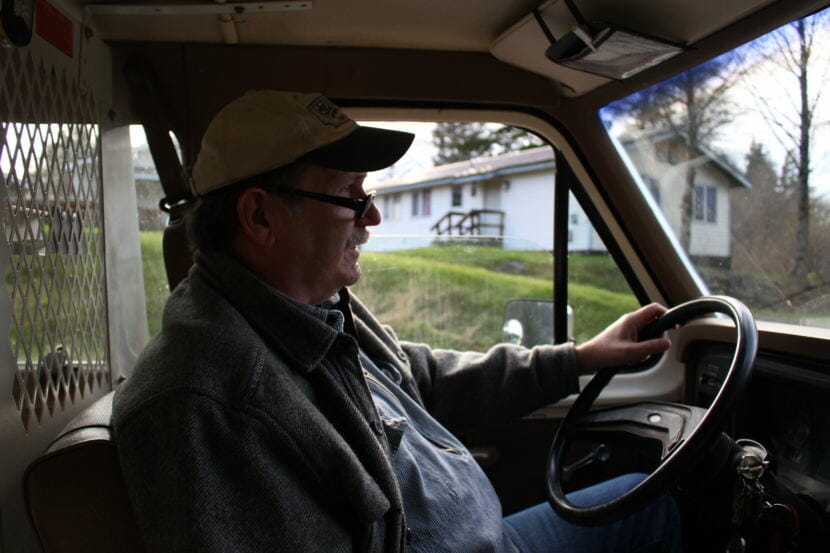
Only 40 people work at Viking Lumber. But the mill is the local electric utility’s biggest year-round customer, and it offers some of the few jobs available in the off-season.
Watson says he’s traveled to Washington D.C. to try to explain that to federal agencies. But on those trips, he’s walked away feeling ignored.
He hopes President Donald Trump can turn things around.
“Like anyone else, I just roll my eyes at some of the things he does. But I couldn’t have voted for Hillary Clinton if somebody had a gun at my head.” Watson said. “I thought that if Clinton had been elected, we’d be pushed aside and our communities would start drying up here in Southeast Alaska.”
Still, not everyone in town thinks there’s a timber industry worth saving here. Bob Claus has lived on the island for decades. He’s also a member of conservation group that’s argued for more environmental protections in the Tongass.
Claus says he knows loggers who have successfully transitioned to a new job in Craig, and he thinks the town can survive just fine without Viking Lumber.
“I think the logging era is over in Southeast Alaska and nowhere else in the national forest system do people even contemplate logging old growth,” Claus said. “And I think it’s a mistake to be logging the last bits of it on the Tongass.”
But Bryce Dahlstrom, the owner of Viking Lumber, says in the past year, he’s started to think the mill may have a future on Prince of Wales Island.
A federal watchdog agency recently decided Congress will have the chance to weigh in on what happens in the Tongass National Forest. Cutting old growth trees could still be on the table.
Still, he’s not exactly optimistic. And he says if his community is going to turn into a tourist town, he doesn’t plan on sticking around.
“I guess to see one of my employees in a grocery store after we weren’t able to keep them working would be pretty tough,” he said.
Dahlstrom says no one wants to be on watch when the last big sawmill in the state shuts down.
Tongass in Transition is a series about trees told through the stories of people. Reporting for this was made possible by an award from the Institute for Journalism and Natural Resources.
